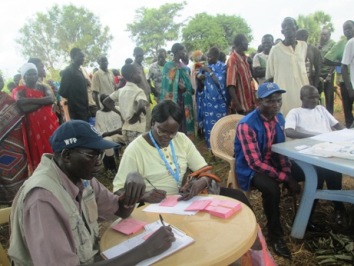W. Bahr el Ghazal receives over 600 displaced people from Unity state
August 29, 2014 (WAU) – South Sudan’s Western Bahr el Ghazal state has received 615 internally displaced people (IDPs) from Unity state following recent clashes between rebel forces and government troops.

Mother of five Nyamal Gatwich said she had been sheltering at a UN camp in Unity state since fighting broke out in January before she and her family were transferred to Mayom county, where they come under heavy attack by rebel forces.
Speaking to Sudan Tribune on Friday at a transit point in Eastern Bank, about 1km from town, she claimed rebel forces had prevented local people from carrying out agricultural activities and had been responsible for stealing livestock, as well as the rape and abduction of women.
She said the increasingly volatile situation in Unity state had forced her to flee to Western Bahr el Ghazal for her own safety and that of her children.
Ayen Deng, who escaped from Biemnhom in Unity state, said that she had lost her children after fighting escalated between the warring parties, adding that she had managed to rescue one child after her village was attacked by rebels.
“In our long travel to Wau we have lost our properties, and here in this camp we are suffering from lack of food and shelters. We do not have plastic sheet, mosquito nets and food to eat; we are really suffering,” said Deng.
She said she was now living with her family under the trees and that her children were suffering from malaria due as a result of heavy rains and poor sanitation.
According to Deng, many of the displaced people had yet to receive any humanitarian assistance from UN agencies since arriving at the transit camp and were surviving on ground nuts provided by the local community.
She has urged the state government to lobby UN agencies to provide urgent basic supplies, including plastic sheets and food items.
Prominent Bentiu businessman Ater Achiek, who hails from the Dinka tribe, said he had fled Unity state with his wife, an ethnic Nuer, after she was targeted.
“When the fighting started in the town, my in-laws put more target on my wife, who is from their tribe, that she must to be kill because she was married by a Dinka, which lead me to leave Unity state with my family,” he said.
While recent fighting in Unity state did not appear to be tribal, he said rebels had targeted civilians in government-controlled areas.
UN agencies, including representatives from the World Food Programme (WFP), the International Organisation for Migration (IOM) and the World Health Organisation (WHO), were seen on the ground on Friday at the transit registering new arrivals.
Justin Anyui Titkuei, the deputy director of the Western Bahr el Ghazal branch of the South Sudan Relief and Rehabilitation Commission (SSRRC), said the agency had already allocated land at the Eastern Bank for settlement of IDPs and is currently coordinating with UN bodies on the provision of humanitarian support.
He said the WHO had begun to dispense medicine to IDPs at the site, while the UN refugee agency (UNHCR) had taken control of security and WFP is in the process of distributing food items.
A political dispute in South Sudan’s ruling party (SPLM) erupted in violence in mid-December last year, triggering tribal tensions across the country.
The fighting has pitted the South Sudanese army (SPLA) loyal to president Salva Kiir, a Dinka, against rebel forces aligned with former vice-president Riek Machar, who is of Nuer ethnicity.
The humanitarian situation in South Sudan has continued to deteriorate since the conflict erupted, with negotiations between the warring parties, which are being mediated by the Intergovernmental Authority on Development (IGAD), failing to halt the violence.
Meanwhile, peace talks recently suffered a further setback after being postponed until next month, with both sides accusing the other of lacking commitment to the peace process.
(ST)
